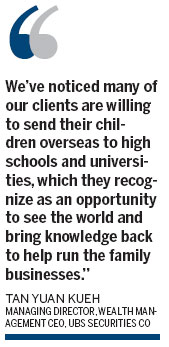
Handing over the family firm can present challenges, say observers
The best gift Chen Xiuqing believes he has given his daughter is to have sent her to a private school in the United Kingdom.
|
 |
|
Family businesses in China are mostly small- and medium-sized enterprises located in the eastern coastal provinces engaging in manufacturing industry, wholesale and the retail trade. Many of these businesses' owners are now more than 50 years old. They want their children to have the highest level of education to ensure a promising path to a successful future. [Photo/China Daily] |

The property developer from Wenzhou, in Zhejiang province, enlisted 15-year-old Chen Tingshu at Queenswood School, a well-known girls-only independent Methodist school, last year for the eighth grade.
"I want my daughter to receive better education in manners and practical abilities, which she probably will fail to develop if she stays in China for further education," said Chen.
The doting father added he had to pay tuition fees of 10,000 pounds a term, including accommodation costs, which increase every year.
"Compared with other private schools with lower requirements, there are more local students from higher class or well-educated families in the UK and fewer international students like my daughter," said Chen.
An increasing number of wealthy parents are realizing that ensuring their children receive the highest level of education is a better guarantee of a successful future.
"We've noticed many of our clients are willing to send their children overseas to high schools and universities, which they recognize as an opportunity to see the world and bring knowledge back to help run the family businesses," said Tan Yuan Kueh, managing director and wealth management chief executive officer at UBS Securities Co.
Kueh added that most second generations of entrepreneurs in China are the only child in the family and receive excessive expectations from their parents to be successful.
In order to help the two generations out, the UBS Wealth Management offers holistic services to families including specialty designed education programs for second generations.
"Our model of wealth management is not selling products to clients, but advising them on their needs at their different life stages, be it their investments, business or family including their objectives and concerns with regard to their children," said Kueh.
Kueh added that UBS wealth management offers the younger generation with programs ranging from longer courses which cover finance, leadership and personal development, to career talks to forums about overseas education to summer camps or internships.
Although most of the entrepreneurs who send their children abroad want them back to take over the family business, more of the second generation are refusing to do so after experiencing life overseas.
Yan Zhuping, 27, thinks taking over his father's business will not make his life as meaningful as he wants it after studying in Australia for nearly four years.
Yan's father owns a company manufacturing and selling medical equipment to hospitals. However, Yan wants to make money his own way.
"My father and I reached an agreement that I don't have to take over his business, the reins of which were handed to a professional manager two years ago," said Yan, a beneficiary of his parents' successful business.
Having returned to China in 2009, Yan is now a salesman at a local fund management company.
"At least I am doing what I am fond of, something I will never give up," said the young man, adding he is proud he represents a positive image of the rich second generation.
Family businesses in China are mostly small and medium-sized enterprises located in the eastern coastal provinces and engaging in manufacturing industry, wholesale and the retail trade, having been going for an average of 20 to 30 years.
"It's clear that fewer of the second generation want to inherit the family businesses because differences exist between the two generations in terms of management concepts, career goals and expectations about the industry," said Kueh from UBS Securities.
She added the best solution for those families having second generations who are not interested in inheriting the family businesses is to hire professional mangers to maintain the family brand.
"Because conflicts can occur between a hired professional manager and the second-generation entrepreneur, the business owner might feel confused as to whose side to take. This is happening more frequently since the concept of professional managers was introduced," said Yu Shixiong, a professor with the Overseas Education College at Shanghai Jiao Tong University.
He added it is better to have professional managers in family businesses taking up the role of an assistant rather than a decision maker.
Unlike Yan, 26-year old Si Yongrong will take over the family business in two years, after she gains enough work experience to expand her own abilities. She is currently working as a human resources manager at an automobile parts manufacturer and supplier in Shanghai.
"I have to wake up at 6 am and start working at 8 am in the suburbs, the same as other white-collar workers," she said, adding she is just an ordinary, positive and passionate young woman who shouldn't be treated differently just because of her wealthy family background.
"I wanted to see and learn the operation, management and challenges in other successful businesses before taking over the family business," said Si.
She added that if she joins the family business she will probably expand it into the wider trading industry, the area she majored in at university.
The company used to be involved in construction and now concentrates on stock market investments.
yuran@chinadaily.com.cn
 Electric car industry in the slow lane
Electric car industry in the slow lane Gas license auctions get mixed reviews
Gas license auctions get mixed reviews Market flat, Japan-brand sales plummet
Market flat, Japan-brand sales plummet China initiates new exporter review for Nissan
China initiates new exporter review for Nissan